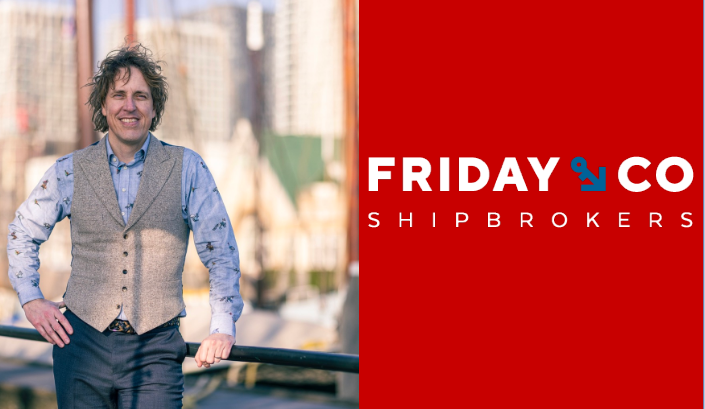
Interview with Rod Schlick – Friday & Co. Shipbrokers
At Friday & Co.
The explanation on the homepage of this shipbroker company as to why they decided to call their business Friday & Co. Shiprbrokers will trigger the curiosity of many a first-time reader. ‘When it comes to buying and selling vessels, every day should feel like a Friday. Friday is the day we can look back on a satisfying work week. For a positive feeling. (…) It captures the feeling that we love what we do and (as we see it) we’re pretty good at it, too: buying and selling dry cargo ships, heavy cargo ships, coasters, tankers, tugs and offshore vessels. Gauging and analysing the shipping market. Providing advice. Determining the value of vessels. And, above all: assisting shipowners in the successful purchase or sale of seagoing vessels.’

Although the name Friday & Co. is relatively new, the company itself is not. Rod Schlick started working at this broker business in 2003 and quickly took over the company. The former captain who studied both maritime economics and maritime law got into the ship brokering business by accident. “I wanted to become a shipowner,” he says, “but I decided to follow this side track and discovered that it is the perfect job for me.” Friday & Co was created in 2017 when the Dutch ARAS Shipbrokers and Latvian Smilgas Shipping joined forces. With offices in Rotterdam and Riga, their activities take place primarily in Europe though they can assist internationally too. Schlick explains that since he took over they built up the company with a small team of committed young brokers. “We work hard and we play hard. It is important to have a good balance between the two. In order to grow your company and attract the younger generation you have to get a little out of your comfort zone. And it isn’t that difficult. The core business remains the same – you want to serve your clients properly and provide them with good information. But we believe it is important to invest in long-lasting client relationships. Not only do we help by way of providing information, doing research and negotiating but we think the post fixture is very important. Instead of hiring a lawyer we can handle that process for our clients too – and become an extension of a shipowner’s business. Schlick laughs and says, “A good shipowner knows he can (mis)use a broker. It is a give and take kind of business. You need to have a good click, so you can trust each other. That is how we can provide the best business.”
Fostering transparency
The most important aspect of the brokering business is the gathering of information. Especially when it comes to a niche market. Schlick clarifies, “The more niche you go, the less information there is. So that is our challenge. We talk to a lot of people and gather information all day. Some other markets, like the deep sea market for instance, are much more transparent. But in the niche segments not much is published openly. It hampers the entire sector because no one is willing to share information.” He continues, “I always wonder why people are not more open. I think you can actually benefit from it. In the future we need more transparency. Sometimes you are not allowed to share information contractually. But we try to communicate as many facts and figures as we can, by way of reports for the short sea market for instance or by making benchmark ships with standard dimensions or specifications. It creates a market indication on certain subtypes. That way you still give proper information about the market but don’t hurt anyone in the process.” This transparency in the market is really important according to Schlick, “I understand people keep the cards close to their chest but in order for the market to work properly we need more transparency in the niche trade. I appreciate that owners don’t want to share too much information but it is a give and take. It is not a one-way street.”

Ensuring a competitive edge
“Last year shipping had a very good year,” says Schlick, and continues, “This year might be a little less profitable but there are so many subsegments. That means different market and pricing dynamics. No one knows exactly what will occur. It is a worldwide market so what happens in Europe might be different to what goes on in China or in the United States.” Schlick makes clear, “ You have no control over the various demand changes. Consumption might decrease or the recession could influence the sector. Certain troubles with manufacturing in China or the war in Ukraine, all these factors can influence the market.” Schlick remains quite positive though. “There will be changes but most people have a good solid base at the moment. And what we do have control over is our own development. We have to continue to improve. If you want to survive you have to realise that you need to provide more tailored information. As a shipbroker that means that you need to invest in information technology. And yes, that is expensive, but it is necessary. “ There are other opportunities opening up as well with the changes in the emission regulations for example. Schlick explains, “It means that a lot of existing ships need to be retrofitted. Our advice can help to figure out what designs are best to refit in certain trades. Or what will be easy to convert so you can fulfill requirements for the next fifteen years. That way you gain more time to adjust to the regulations. Many companies are frontrunners when it comes to the new requirements but there are also smaller businesses that do not have the same amount of resources. The information we provide can help them make decisions for the future. Being able to provide this information is what can give you a competitive edge as a broker.”
It’s not all about money
According to Schlick, it is clear as day that we need to take our heads out of the sand and deal with the energy transition, however difficult it may be. Schlick, “Really brave people invest a lot of money into the transition and I applaud that. But there are still a lot of people that are only driven by money. This may sound a little weird coming from the mouth of a commercial broker but when money triumphs it tends to not always lead to the right decisions. This is easily said whilst standing on the sideline but sometimes your principles should prevail. Take our sister company in Riga, Latvia, for example. Even though roughly 60% of their business came from Russia before the war started, and that market can be very lucrative, they stood their ground and decided not to engage any longer.”
Changing the perspective on shipping
The general public has quite a negative view of the shipping market, according to Schlick. “In the Netherlands, it is quickly associated with the history of the United East India Company, with pollution and the harmful environmental impact. But shipping is a very interesting market. Think about the people, for instance. If you have a bright mind you can make it in this market segment without a university degree. And the different characters and cultures make it fun. Secondly, it is a dynamic segment, and thirdly, shipping is a vital, international business. Many people do not even realise that their sneakers are transported by ships from the other side of the world. We need to educate the youth to get them involved in shipping and to change the perspective of this market. It is a great industry to be in.”
